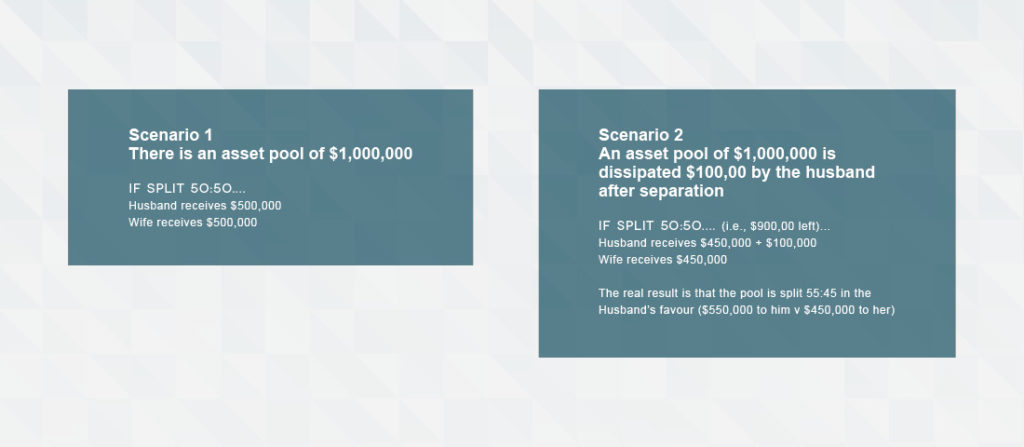
All too often in Family Law, lawyers as well as the court are faced with circumstances where one party tries to thwart their former spouse’s entitlements to a just and equitable property settlement by decreasing the size of the net asset pool available for division.
Imagine this by way of example:
We have seen people try to reduce the asset pool in many different ways; however, there are also many different ways to deal with such behaviour and hold people accountable. For some, it may also be possible to take steps to prevent the other spouse acting in a way which may minimise their entitlements.
A common scenario is where one party withdraws money from a joint account or redraw facility shortly after separation. One of the ways you can protect yourself financially at separation is to ensure joint accounts, such as offset accounts or redraw facilities where couples typically have access to larger amounts of cash, cannot be withdrawn or transferred without both parties’ signatures. That way, one spouse cannot withdraw large amounts of cash without knowledge and approval of the other.
Unfortunately, clients sometimes come to us once it’s too late and assets have already been dissipated or disposed of by their spouse. However, there are still ways to ensure you receive a just and equitable property settlement.
It is possible in certain circumstances to argue that property or assets have been prematurely distributed by one party should count as them having already received that benefit as part of their overall property settlement. Taking the above two scenarios, when working out each party’s 50% entitlement, the Husband will be taken to have already received the $100,000 he dissipated and his entitlement will be reduced accordingly, so he would only receive another $400,000 and the Wife would receive $500,000 (not just $450,000).
Another common scenario is when one party attempts to reduce the size of the asset pool by claiming they owe money to third parties, usually friends and/or family members. If one party makes such a claim, the easiest way to deal with that situation is to focus on the evidence. The person who claims they owe money will need to prove it and we often find those alleged loans are not documented in any loan agreement and prior to separation no repayments had ever been made. It’s sometimes as if the loan magically appeared after separation. The friend or family member who claims they are owed money also risks getting involved in the family law proceedings and may find their bank accounts subpoenaed and be required to swear affidavits and give evidence at court, which they will often want to avoid.
Another scenario is when a party has reduced the size of the asset pool by incurring financial losses. Generally speaking, financial losses which are incurred during a relationship should be shared by the parties equally. However, if it can be shown that the financial losses were a result of one of the parties embarking on a course of conduct designed to minimise the asset pool or where they have acted recklessly or negligently with matrimonial assets, it may also be possible to argue that the loss should only be the responsibility of the guilty party and not shared equally. That is a useful way of dealing with a situation where, rather than spending $100,000 of the parties’ joint assets, one party goes out and takes out loans or incurs significant debts to minimise the asset pool, sometimes simply out of spite rather than necessity.
Whilst the court generally only looks at existing property interests between the parties, it is important to know there are mechanisms under the law that permit the adjustment of property interests in favour of an ‘innocent’ party so that a just and equitable result is achieved overall.
If you or someone you know are going through a separation and want to know your entitlements in a property settlement or how you can ensure you receive a just and equitable result if the other party has tried to reduce the asset pool, please phone 1800 600 664 or complete the contact form on this page.
Our family law team will be happy to meet with you and provide strategic Family Law advice.
At Taylor & Scott, “we care for you”.



